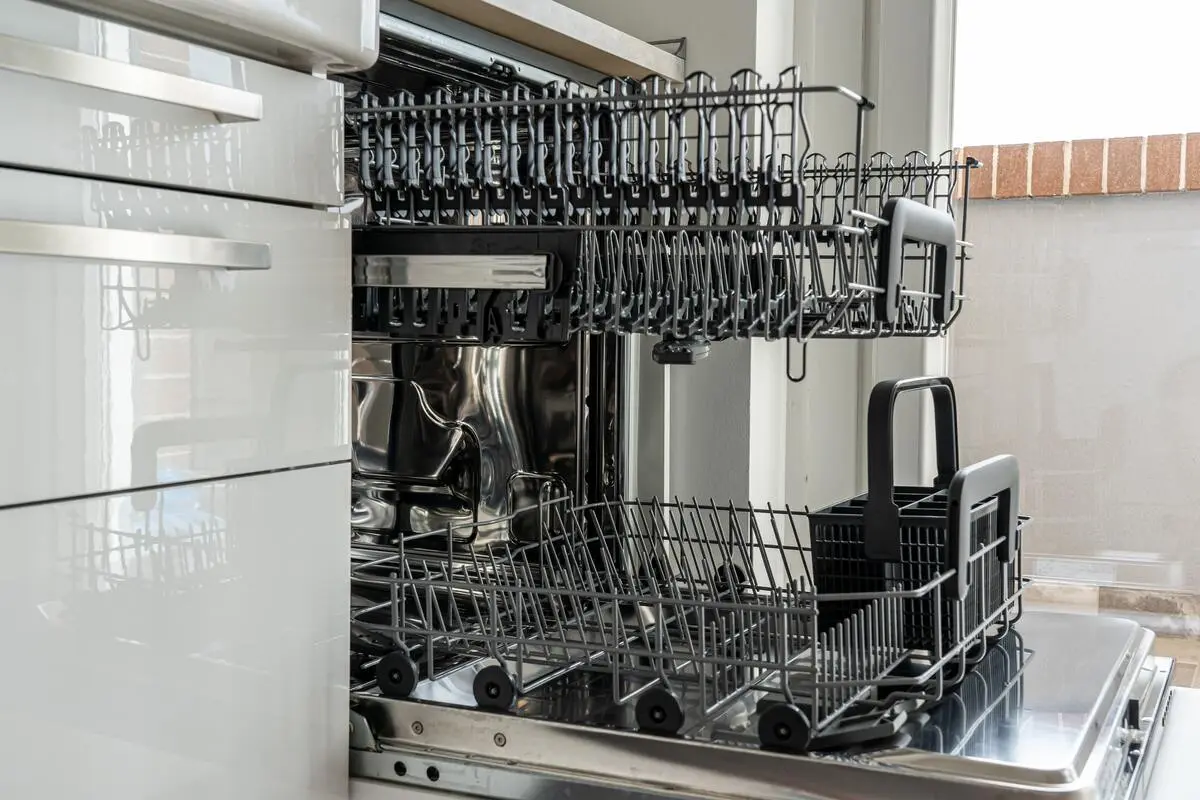Last Updated on September 5, 2023
Choosing the right dishwasher for your kitchen is a crucial decision that can greatly impact your daily life. A well-selected dishwasher not only saves you time and effort but also contributes to the overall aesthetic and functionality of your kitchen. In this ultimate guide, we will walk you through the essential factors to consider when choosing a dishwasher, ensuring that you make an informed decision that meets your specific needs and preferences.
Assessing Your Needs
Before diving into the world of dishwashers, it is important to assess your kitchen’s space limitations. Measure the available space in your kitchen to determine the dimensions that your dishwasher should fit within. This will help you narrow down your options and avoid any potential installation headaches.
Additionally, identifying your dishwasher capacity requirements is crucial. Consider the size of your household and the number of dishes you typically need to clean in one load. This will guide you in choosing a dishwasher with the appropriate capacity to accommodate your needs.
In addition to space and capacity considerations, think about any special features and functionalities you desire in a dishwasher. Do you want adjustable racks to accommodate larger pots and pans? Or perhaps a dishwasher with a specialized cleaning cycle for delicate stemware? Evaluating these special features can further narrow down your choices and ensure you find a dishwasher that truly meets your unique requirements.
Types of Dishwashers
When it comes to dishwasher types, there are three main options to choose from: built-in dishwashers, portable dishwashers, and drawer dishwashers.
- Built-in dishwashers : are the most common choice for kitchens with dedicated space for a dishwasher. They are installed directly under the kitchen countertop, providing a seamless and integrated look. Built-in dishwashers offer a wide range of sizes, styles, and features to choose from, making them suitable for various kitchen layouts and design preferences.
- Portable dishwashers : on the other hand, are a great solution for kitchens without built-in dishwasher space or for those who prefer the flexibility of a movable appliance. These dishwashers are equipped with wheels, allowing you to easily move them around and connect them to the kitchen sink when needed. Portable dishwashers come in different sizes and designs, making them a versatile option for various kitchen setups.
- Drawer dishwashers : as the name implies, feature a unique drawer-style design that allows for more flexibility. They typically come in single or double drawer configurations, allowing you to run different loads simultaneously or choose the appropriate drawer size for smaller or larger loads. Drawer dishwashers are a popular choice for smaller kitchens or those who prioritize convenience and customization.
Dishwasher Sizes
Dishwashers come in different sizes to suit various kitchen needs and space constraints. The two main sizes to consider are standard and compact dishwashers.
- Standard dishwashers are the most common size, typically measuring around 24 inches in width and 35 inches in height. These dishwashers offer ample capacity for larger households and come in a wide range of styles and features.
- Compact dishwashers, on the other hand, are designed for kitchens with limited space or for those who don’t require a full-size dishwasher. They are usually around 18 inches in width and can be installed under the counter or on top of it. Despite their smaller size, compact dishwashers still offer efficient cleaning and a variety of features to enhance usability.
Dishwasher Features and Options
When selecting a dishwasher, it is essential to consider the various features and options available, as they can greatly enhance your overall dishwasher experience.
One important feature to look for is energy efficiency ratings. Opting for a dishwasher with a high energy efficiency rating can help save both energy and money in the long run. Look for dishwashers with the ENERGY STAR label, indicating that they meet strict criteria for energy efficiency.
Noise levels can also play a significant role, especially if your kitchen opens up to a living or dining area. Dishwashers with lower noise levels often come equipped with noise reduction technologies, allowing for a quieter operation while still providing powerful cleaning performance.
In terms of washing and drying options, some dishwashers offer specialized cycles such as intensive cleaning, quick wash, or delicate modes. These options can be highly beneficial when dealing with heavily soiled dishes, time constraints, or fragile glassware.
Adjustable racks and interior flexibility are features worth considering, as they allow you to customize the dishwasher’s interior to fit your needs. Look for dishwashers with adjustable or foldable tines, removable racks, and flexible loading options, enabling you to accommodate larger or awkwardly shaped items with ease.
Finally, consider dishwashers with specialized cleaning cycles tailored for specific items, such as pots and pans or baby bottles. These cycles ensure effective cleaning for specific utensils or dishes, saving you from excessive manual pre-washing or relying on separate cleaning methods.
Budget Considerations
Determining your budget range is an essential step in the dishwasher selection process. Dishwashers come in a wide range of price points, and setting a budget can help narrow down your options and ensure that you focus on models that fall within your price range.
In addition to the upfront cost of purchasing a dishwasher, it is important to evaluate long-term costs. Consider factors such as water and energy consumption, detergent usage, and potential maintenance or repair expenses. While a more expensive dishwasher may have higher upfront costs, it may also be more energy-efficient and durable, resulting in cost savings over time.
Exploring financing options is another consideration. Many retailers offer financing plans or credit options that can help make a larger investment more manageable. Be sure to research the terms and conditions of any financing option and consider whether it aligns with your financial goals and abilities.
Popular Dishwasher Brands
When it comes to dishwasher brands, there are several top contenders known for their quality and reliability. Here is a review of some of the most popular dishwasher brands, along with their pros and cons and customer ratings and reviews:
- LG: Known for its sleek designs and innovative features, LG consistently receives high praise for its cleaning performance. However, some customers have reported issues with customer service and longer-than-expected repair times.
- Beko: With a reputation for durability and robust construction, Beko offers a wide range of dishwasher models to suit different budgets. Customers appreciate its quiet operation and efficient cleaning, although a few have mentioned occasional leaks.
- Haier: Highly regarded for its energy efficiency and eco-friendly features, Haier has gained a loyal following. Customers rave about its low energy consumption and powerful cleaning, although some have noted a slightly higher price point.
Installation Considerations
Installing a dishwasher involves careful consideration of space requirements, plumbing, and electrical considerations. Understanding these factors will help you determine whether a DIY installation is feasible or if professional installation is necessary.
First, ensure that you have sufficient space for the dishwasher you intend to purchase. Measure the available width, height, and depth, taking into account any surrounding cabinetry or countertop constraints. Proper measurements will prevent headaches during the installation process.
Plumbing considerations include the proximity of your dishwasher to a water source and a drain. Some dishwashers can be connected directly to the existing plumbing, while others may require additional plumbing modifications. Determine whether your kitchen’s plumbing infrastructure can support the dishwasher installation or consult a professional plumber if needed.
Electrical considerations involve ensuring that your kitchen has the necessary electrical outlets and circuitry to power the dishwasher. Dishwashers typically require a dedicated electrical circuit, so it is essential to assess your kitchen’s electrical capacity in advance. Consult an electrician if you have any doubts or need assistance with electrical connections.
While some homeowners may opt for a DIY installation to save costs, others prefer professional installation to guarantee proper setup and minimize the risk of potential issues. Consider your skills, confidence level, and the complexity of the installation process before deciding which route to take.
Maintenance and Care
To ensure optimal performance and prolong the lifespan of your dishwasher, regular cleaning and maintenance are crucial. Here are some helpful tips to keep your dishwasher in top shape:
- Regularly clean the dishwasher’s interior, including the tub, racks, and filters, to remove any food debris or residue. Use a dishwasher-safe cleaning solution or a mixture of vinegar and baking soda for a natural alternative.
- Pay attention to the dishwasher’s spray arms and check for any clogs or blockages. Clear any debris that may affect water flow and cleaning performance.
- Check the dishwasher’s door seals and gaskets for any signs of wear or damage. Replace them promptly if necessary, as they play a vital role in preventing leaks and maintaining a watertight seal.
- Run maintenance cycles recommended by the manufacturer to remove mineral buildup and keep your dishwasher functioning at its best.
Inevitably, you may encounter common troubleshooting issues such as a dishwasher not draining, dishes not drying properly, or unusual noises during operation. Consult the dishwasher’s user manual for troubleshooting steps or contact customer support for assistance specific to your model.
By following these maintenance and care practices, you can extend the lifespan of your dishwasher and optimize its performance for years to come.
Conclusion
In conclusion, choosing the right dishwasher for your kitchen is a decision that should not be taken lightly. By assessing your needs, considering different types and sizes of dishwashers, evaluating features and options, setting a budget, and researching popular brands, you can make an informed decision that fulfills all your requirements.
Remember the importance of installation considerations, such as space, plumbing, and electrical requirements, and carefully follow maintenance and care practices to ensure the longevity and reliable performance of your dishwasher.
Now armed with this ultimate guide, you are ready to embark on your journey to finding the perfect dishwasher for your kitchen. Make a choice that not only suits your practical needs but also adds convenience and elegance to your everyday life. Happy dishwashing!



